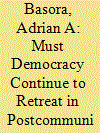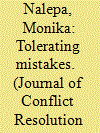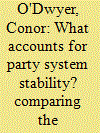|
|
|
Sort Order |
|
|
|
Items / Page
|
|
|
|
|
|
|
| Srl | Item |
| 1 |
ID:
080755


|
|
|
|
|
| Publication |
2008.
|
| Summary/Abstract |
In late 2004, Ukraine's Orange Revolution appeared to herald a second wave of democratic transformation destined to sweep through much of postcommunist Europe and Eurasia. Now, only three years later, this wave has dissipated. Some analysts see democracy as being in retreat and they view the lessons of 1989-2004 as no longer applicable. This article posits that democratic progress is, in fact, still achievable in many former communist countries, and that a look at recent history provides important perspectives towards that goal. However, both the region's reform leaders and Western policy makers must also take full account of the new "post-postcommunist" paradigm. This paradigm is characterized by Russia's negative and increasing influence, the European Union's "expansion fatigue," the waning of U.S. democracy-promotion efforts and credibility, and some degree of democratic disillusionment. With re-invigorated and more united efforts, the impressive post-1989 gains in democratization can be consolidated and new momentum built towards the goal of "a Europe whole and free."
|
|
|
|
|
|
|
|
|
|
|
|
|
|
|
|
| 2 |
ID:
145471


|
|
|
|
|
| Summary/Abstract |
This article seeks to identify the determinants of ethnic parties’ access to coalition governments in Bulgaria, Romania, and Slovakia between 1990 and 2013. We conducted a cross-national and longitudinal analysis in which we took into account all the elections in which the ethnic parties gained parliamentary representation. With 21 cases over two decades—with the party at the election being the unit of analysis—and Qualitative Comparative Analysis (QCA) as the method of analysis, this study concludes that the pivotal position is important for access to government coalitions, while organizational change and government incumbency have a limited explanatory power.
|
|
|
|
|
|
|
|
|
|
|
|
|
|
|
|
| 3 |
ID:
113756


|
|
|
|
|
| Publication |
2012.
|
| Summary/Abstract |
How do perceptions of procedural fairness shape the preferences that citizens have for transitional justice (TJ) in postauthoritarian countries? This article uses original opinion poll data collected in Poland, Hungary, and the Czech Republic to investigate this question. It shows that differences in the demand for TJ are explained by how citizens perceive whether the TJ process commits errors-that is, whether the innocent are condemned (falsely convicted) or the guilty are exonerated (falsely acquitted). This is so even after accounting for threat perceptions of former autocrats and voting behavior. After comparing the ways in which citizens' perceptions of errors in the TJ process shape their demand for lustration in the three postcommunist countries, the author discusses the implications of these findings for scholars of democratic consolidation, social psychologists, and policy makers designing TJ systems.
|
|
|
|
|
|
|
|
|
|
|
|
|
|
|
|
| 4 |
ID:
131148


|
|
|
|
|
| Publication |
2014.
|
| Summary/Abstract |
Why do party systems stabilise quickly in some new democracies while others remain in extended flux? As a core variable of comparative politics, party system stability has led scholars to generate various theoretical explanations, but consensus is still lacking. Given its widely divergent party systems, postcommunist Europe presents an important opportunity to revisit stability's determinants. Applying hypotheses derived from theories about competition in multidimensional policy spaces, I find that they better explain variation in a 14-case sample than contending hypotheses about the electoral system, economic performance, constitutional design, political culture, or previous democratic experience.
|
|
|
|
|
|
|
|
|
|
|
|
|
|
|
|
|
|
|
|
|